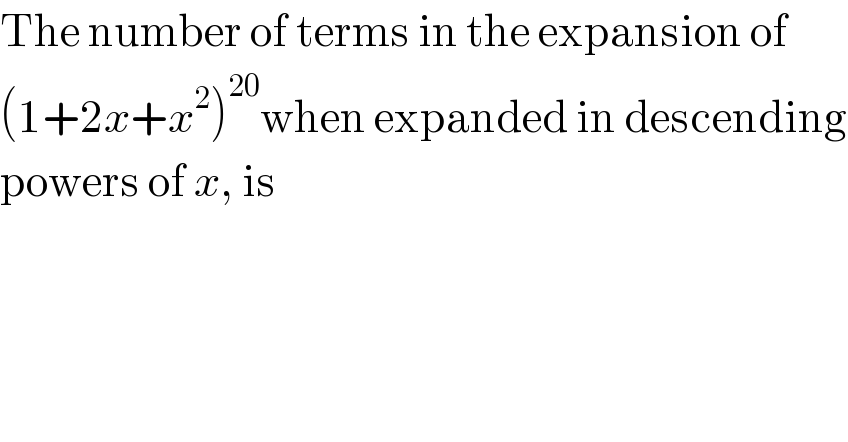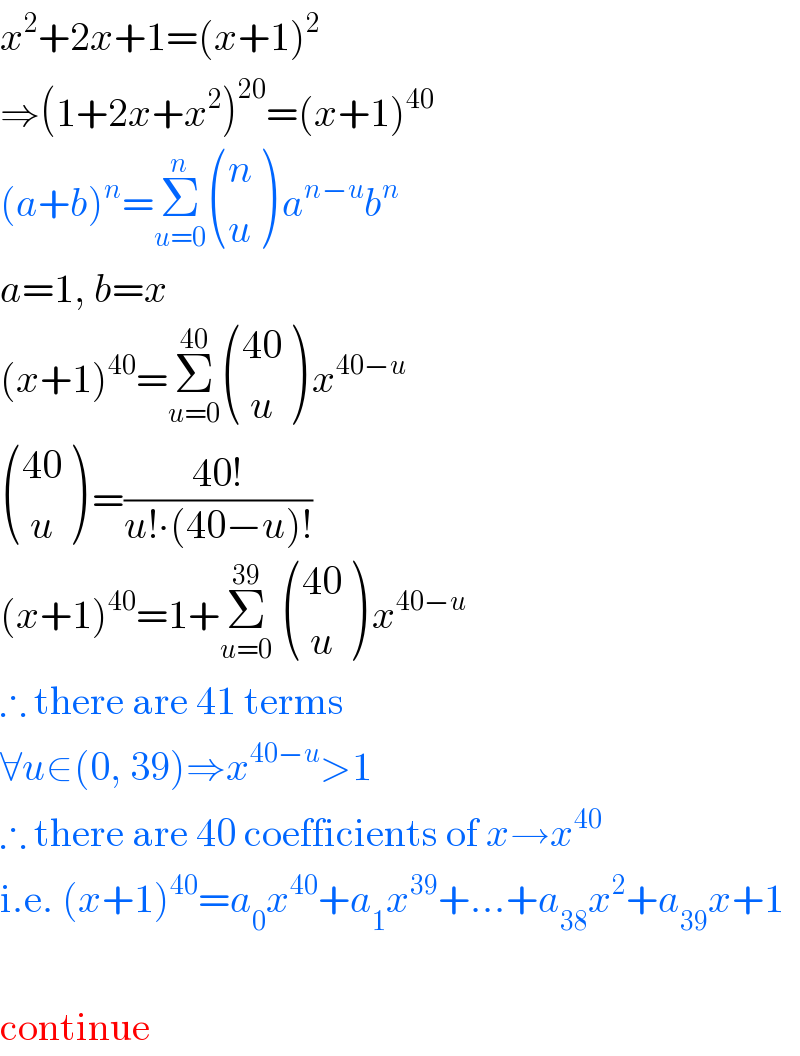
Question Number 10544 by j.masanja06@gmail.com last updated on 17/Feb/17

$$\mathrm{The}\:\mathrm{number}\:\mathrm{of}\:\mathrm{terms}\:\mathrm{in}\:\mathrm{the}\:\mathrm{expansion}\:\mathrm{of} \\ $$$$\left(\mathrm{1}+\mathrm{2}{x}+{x}^{\mathrm{2}} \right)^{\mathrm{20}} \mathrm{when}\:\mathrm{expanded}\:\mathrm{in}\:\mathrm{descending} \\ $$$$\mathrm{powers}\:\mathrm{of}\:{x},\:\mathrm{is} \\ $$
Commented by FilupS last updated on 18/Feb/17

$${x}^{\mathrm{2}} +\mathrm{2}{x}+\mathrm{1}=\left({x}+\mathrm{1}\right)^{\mathrm{2}} \\ $$$$\Rightarrow\left(\mathrm{1}+\mathrm{2}{x}+{x}^{\mathrm{2}} \right)^{\mathrm{20}} =\left({x}+\mathrm{1}\right)^{\mathrm{40}} \\ $$$$\left({a}+{b}\right)^{{n}} =\underset{{u}=\mathrm{0}} {\overset{{n}} {\sum}}\begin{pmatrix}{{n}}\\{{u}}\end{pmatrix}\:{a}^{{n}−{u}} {b}^{{n}} \\ $$$${a}=\mathrm{1},\:{b}={x} \\ $$$$\left({x}+\mathrm{1}\right)^{\mathrm{40}} =\underset{{u}=\mathrm{0}} {\overset{\mathrm{40}} {\sum}}\begin{pmatrix}{\mathrm{40}}\\{\:{u}}\end{pmatrix}\:{x}^{\mathrm{40}−{u}} \\ $$$$\begin{pmatrix}{\mathrm{40}}\\{\:{u}}\end{pmatrix}\:=\frac{\mathrm{40}!}{{u}!\centerdot\left(\mathrm{40}−{u}\right)!} \\ $$$$\left({x}+\mathrm{1}\right)^{\mathrm{40}} =\mathrm{1}+\underset{{u}=\mathrm{0}} {\overset{\mathrm{39}} {\sum}}\:\begin{pmatrix}{\mathrm{40}}\\{\:{u}}\end{pmatrix}\:{x}^{\mathrm{40}−{u}} \\ $$$$\therefore\:\mathrm{there}\:\mathrm{are}\:\mathrm{41}\:\mathrm{terms} \\ $$$$\forall{u}\in\left(\mathrm{0},\:\mathrm{39}\right)\Rightarrow{x}^{\mathrm{40}−{u}} >\mathrm{1} \\ $$$$\therefore\:\mathrm{there}\:\mathrm{are}\:\mathrm{40}\:\mathrm{coefficients}\:\mathrm{of}\:{x}\rightarrow{x}^{\mathrm{40}} \\ $$$$\mathrm{i}.\mathrm{e}.\:\left({x}+\mathrm{1}\right)^{\mathrm{40}} ={a}_{\mathrm{0}} {x}^{\mathrm{40}} +{a}_{\mathrm{1}} {x}^{\mathrm{39}} +...+{a}_{\mathrm{38}} {x}^{\mathrm{2}} +{a}_{\mathrm{39}} {x}+\mathrm{1} \\ $$$$\: \\ $$$$\mathrm{continue} \\ $$
